Understanding the Differences Between Dissertation, Thesis, and Capstone Projects
This article explains the key differences between dissertation, thesis, and capstone projects, and offers insights into how to approach each project to ensure academic success.
If you're pursuing an advanced degree, you may be required to complete a dissertation, thesis, or capstone project as part of your program. While these projects share some similarities, there are also important differences to understand.
A dissertation is typically required for a doctoral degree, while a thesis is required for a master's degree. Both involve extensive research, data collection and analysis, and a written report that contributes to the body of knowledge in the field of study. A capstone project, on the other hand, is typically a culminating project required for a variety of undergraduate and graduate degree programs. It may involve original research, but can also take the form of a creative project or a community service project.
Dissertation: A dissertation is a research project required to complete a doctoral degree program. It is a comprehensive study that contributes to the existing body of knowledge in the field of study. A dissertation typically involves original research, data collection and analysis, and a written report that is expected to make a significant contribution to the field of study.
Thesis: A thesis is a research project required to complete a master's degree program. It is usually a shorter and less complex study compared to a dissertation. A thesis may involve original research, but it can also be a literature review, a case study, or a critical analysis of existing research in the field of study.
Capstone: A capstone is a culminating project required to complete a degree program. It is typically undertaken in the final year of study and integrates the knowledge and skills gained throughout the program. A capstone can take various forms, such as a research project, a creative work, or a community service project. It is designed to demonstrate the student's ability to apply what they have learned to real-world problems.
To successfully complete a dissertation, thesis, or capstone project, it's important to have a clear understanding of the project's purpose and requirements. For example, a dissertation will require a more extensive literature review, data collection, and data analysis than a thesis or capstone project. A thesis may require more original research than a capstone project, but less than a dissertation.
In addition, it's important to work closely with your advisor or instructor throughout the project to ensure that you are meeting the requirements and expectations. You may also want to consider seeking out additional resources, such as writing support or statistical analysis services, to help you complete the project successfully.
By understanding the differences between dissertation, thesis, and capstone projects, and approaching each project with a clear plan and support, you can successfully complete your degree program and contribute to the body of knowledge in your field. In summary, a dissertation is a research project required to complete a doctoral degree program, a thesis is a research project required to complete a master's degree program, and a capstone is a culminating project required to complete a degree program.

Dissertation vs Thesis vs Capstone Project What’s the difference?
By: Derek Jansen (MBA) | Expert Reviewed By: Dr. Eunice Rautenbach | October 2020
At Grad Coach, we receive questions about dissertation and thesis writing on a daily basis – everything from how to find a good research topic to which research methods to use and how to analyse the data.
One of the most common questions we receive is “what’s the difference between a dissertation and thesis?” . If you look around online, you’ll find a lot of confusing and often contrasting answers. In this post we’ll clear it up, once and for all…
Need a helping hand?
Dissertation vs Thesis: Showdown Time
Before comparing dissertations to theses, it’s useful to first understand what both of these are and what they have in common .
Dissertations and theses are both formal academic research projects . In other words, they’re academic projects that involve you undertaking research in a structured, systematic way. The research process typically involves the following steps :
- Asking a well-articulated and meaningful research question (or questions).
- Assessing what other researchers have said in relation to that question (this is usually called a literature review – you can learn more about that up here).
- Undertaking your own research using a clearly justified methodology – this often involves some sort of fieldwork such as interviews or surveys – and lastly,
- Deriving an answer to your research question based on your analysis.
In other words, theses and dissertations are both formal, structured research projects that involve using a clearly articulated methodology to draw out insights and answers to your research questions . So, in this respect, they are, for the most part, the same thing.
But, how are they different then?
Well, the key difference between a dissertation and a thesis is, for the most part, the level of study – in other words, undergrad, master or PhD. By extension, this also means that the complexity and rigorousness of the research differs between dissertations and theses.

So, which is which?
This is where it gets a bit confusing. The meaning of dissertation or thesis varies depending on the country or region of study. For example, in the UK, a dissertation is generally a research project that’s completed at the end of a Masters-level degree, whereas a thesis is completed for a Doctoral-level degree.
Conversely, the terminology is flipped around in the US (and some other countries). In other words, a thesis is completed for a Masters-level degree, while a dissertation is completed for PhD (or any other doctoral-level degree).
Simply put, a dissertation and a thesis are essentially the same thing, but at different levels of study . The exact terminology varies from country to country, and sometimes it even varies between universities in the same country. Some universities will also refer to this type of project as a capstone project . In addition, some universities will also require an oral exam or viva voce , especially for doctoral-level projects.
Given that there are more than 25,000 universities scattered across the globe, all of this terminological complexity can cause some confusion. To be safe, make sure that you thoroughly read the brief provided by your university for your dissertation or thesis, and if possible, visit the university library to have a look at past students’ projects . This will help you get a feel for your institution’s norms and spot any nuances in terms of their specific requirements so that you can give them exactly what they want.

Let’s recap
Dissertations and theses are both formal academic research projects . The main difference is the level of study – undergrad, Masters or PhD. Terminology tends to vary from country to country, and even within countries.
Need help with your research project?
Get in touch with a friendly Grad Coach to discuss how we can help you fast-track your dissertation or thesis today. Book a free, no-obligation consultation here.

Psst… there’s more (for free)
This post is part of our dissertation mini-course, which covers everything you need to get started with your dissertation, thesis or research project.
You Might Also Like:

GRADCOACH youtube and materials are awesome for new researchers. Keep posting such materials so that many new researchers can benefit form them.
Am happy to be part of the family hope you will help me with more information through my email
Trackbacks/Pingbacks
- What Is Research Methodology? Simple Definition (With Examples) - Grad Coach - […] you’ve started working on your first piece of formal research – be it a dissertation, thesis or research project…
Submit a Comment Cancel reply
Your email address will not be published. Required fields are marked *
Save my name, email, and website in this browser for the next time I comment.
- Print Friendly
LET US HELP
Welcome to Capella
Select your program and we'll help guide you through important information as you prepare for the application process.
FIND YOUR PROGRAM
Connect with us
A team of dedicated enrollment counselors is standing by, ready to answer your questions and help you get started.

- Capella University Blog
- PhD/Doctorate
The difference between a dissertation and doctoral capstone
May 30, 2023
Estimated reading time: 3-4 minutes
If youâve been researching doctoral degrees, you may notice that virtually all PhD programs require a dissertation, while some professional doctorates require a doctoral capstone or an alternative doctoral project.
So, whatâs the difference between the two?
What do a dissertation and doctoral capstone have in common?
All doctoral programs help prepare students to contribute evidence-based practice in their field. Students learn to apply leadership principles and strategies that promote community support, diversity and individuality in the workplace, and the community.
Completing either a dissertation or a doctoral capstone requires intense preparation and a strong foundation in writing and critical thinking. Both culminate in a final document or project that demonstrates a broadened knowledge of relevant theory and practice.
What are the main differences between a dissertation and a doctoral capstone?
The Capella doctoral experience offers a good comparison of the two types of final project.
The Capella dissertation is a traditional five-chapter research document that youâll develop as you work with a faculty mentor and dissertation committee members. Itâs meant to be a work of high-quality academic research that contributes to your field of study.
The doctoral capstone can take many different forms depending on your program, your specialization or area of interest within your subject and other variables. Working with a faculty mentor and committee, youâll complete a project that offers solutions or improvements to a real-world problem relevant to your field of study.
- Project focus
- Project deliverable
- Deliverable detail
Doctoral Capstone
- Extends or applies research to solve a real-world problem
- Provides a solution to a problem within a specific organizational setting
- Presents the results in a deliverable (paper, product, or portfolio) and a final report that describes the creation of the deliverable
Dissertation
- Involves a quest for new knowledge to solve a real-world problem
- Addresses a research problem in one field of specialization
- Involves either quantitative or qualitative research methods
- Paper, Product or Portfolio
- Action research
- Clinical Research Paper
- Program Curriculum
- Change Management Plan
- Chapter 1. Introduction and Statement of the Problem
- Chapter 2. Literature Review
- Chapter 3. Methodology
- Chapter 4. Data Analysis and Results
- Chapter 5. Conclusions and Recommendations
Ready to explore the doctoral path that could work best for you? Capella University offers PhD and professional doctorate degree programs ranging from business and education to health care and technology.
Learn more about Capellaâs online doctoral programs.
You may also like

Can I transfer credits into a doctoral program?
January 8, 2020

What are the steps in writing a dissertation?
December 11, 2019

What you need to know about paying for your doctorate
November 11, 2019
Start learning today
Get started on your journey now by connecting with an enrollment counselor. See how Capella may be a good fit for you, and start the application process.
Please Exit Private Browsing Mode
Your internet browser is in private browsing mode. Please turn off private browsing mode if you wish to use this site.
Are you sure you want to cancel?
- Utility Menu
Guide to the ALM Capstone Project
Customstyles.
- Course Catalog
- Research Methods
There are a number of ways to conduct research for your capstone topic, but everyone must start with the literature review in order to learn what has already been published on your topic. The literature review also helps you identify the different research methods used by scholars in the field that have already produced valid and reliable results.
Indeed, the literature review is the very first step and it is begun when you are crafting your capstone proposal. It is the only way to choose a topic and write your background and research methods section for the proposal. Of course, you'll continue to consult published work during the capstone course as well. Because this step is so important, we've created entire section on this topic (please see Literature Review , under Choosing a Topic).
Commonly used methods:
Case studies. Case studies are in-depth investigations of a single individual (noteworthy museum leader), a group (education department), or event (exhibit). Reading prior case studies is a must to inform your design. Reading case studies may also lead you to museum professionals who authored the published work. These experts could become research participants. Case study is a formal research method with a specific structure. For an introduction, visit Basics of Developing a Case Study from the Free Management Library.
Interviews . You may want to conduct interviews with experts in the field on a specific topic, such as, increasing diversity in musuem membership. Museum professionals have a wealth of information and are ordinarily happy to support beginning scholars. Your capstone reader and instructor can help make introductions through their own networks. Interviews are not simple tasks. You'll need to learn how to conduct interviews in such as way that avoids bias and elicits valid data that can be used for analysis. For an introduction, visit General Guidelines for Conducting Research Interviews from the Free Management Library.
Surveys . Conducting a survey is another way to gather research on your topic. Ordinarily, this method is chosen when you want to gather information from a large data set. Survey design is also not a straightforward task. For an introduction, visit the Harvard University Program on Survey Research.
Program evaluation . You may also consider in-depth and detailed evaluation of an aspect of a specific museum's operation, such as an exhibit or educational programs to understand if and how it met its intended goals. For an introduction, visit Evaluation Activities in Organization from the Free Management Library and Evaluations from the Institute of Museum and Library Resources.
- Choosing a Topic
- Precapstone Tutorial
- MUSE E-599 Past Capstone Titles
- Intellectual Property Rights
- Use of Human Subjects
- Frequently Asked Questions

- Customer Reviews
- Extended Essays
- IB Internal Assessment
- Theory of Knowledge
- Literature Review
- Dissertations
- Essay Writing
- Research Writing
- Assignment Help
- Capstone Projects
- College Application
- Online Class
Capstone Project: Definition, Types, Structure, and Examples
by Antony W
January 2, 2024
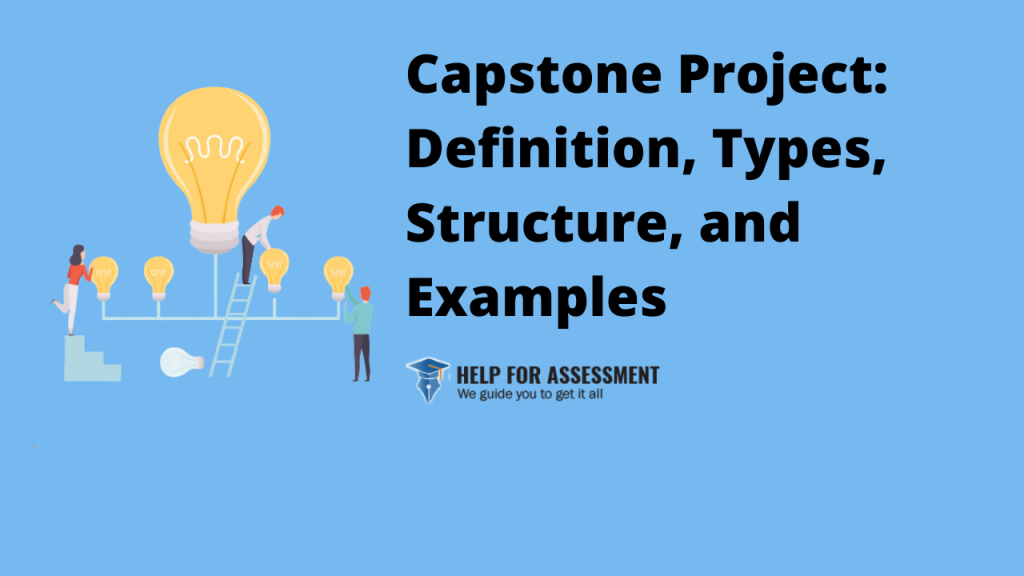
If you're reading this, chances are that you're in your final year of school and the words "capstone project" have come up somewhere in your first or second semester.
You're probably looking for a quick score on the topic - what it's about, a project template, or even a sample. If so, you're in the right place.
Before we get into it, you' need to know that you're in the hands of consummate capstone project experts.
Help for Assessment is composed of scholars at all levels of academic achievement including Masters and Ph.D., all inspired and motivated to help students like you achieve their academic goals. The expertise and experience we have spans years. Even better, this combined academic expertise is placed at your disposal. If your capstone research project is already giving you goosebumps, we will do it for you from scratch including the project proposal, research, write up, and final review before submission.
Remember, you can trust Help for Assessment to complete your capstone project successfully and earn you top grades. All you have to do is order the service here on our service page.
In the meantime, let us explore the definition of the capstone project, types of projects for students, and a sample capstone project.
What Is a Capstone Project?
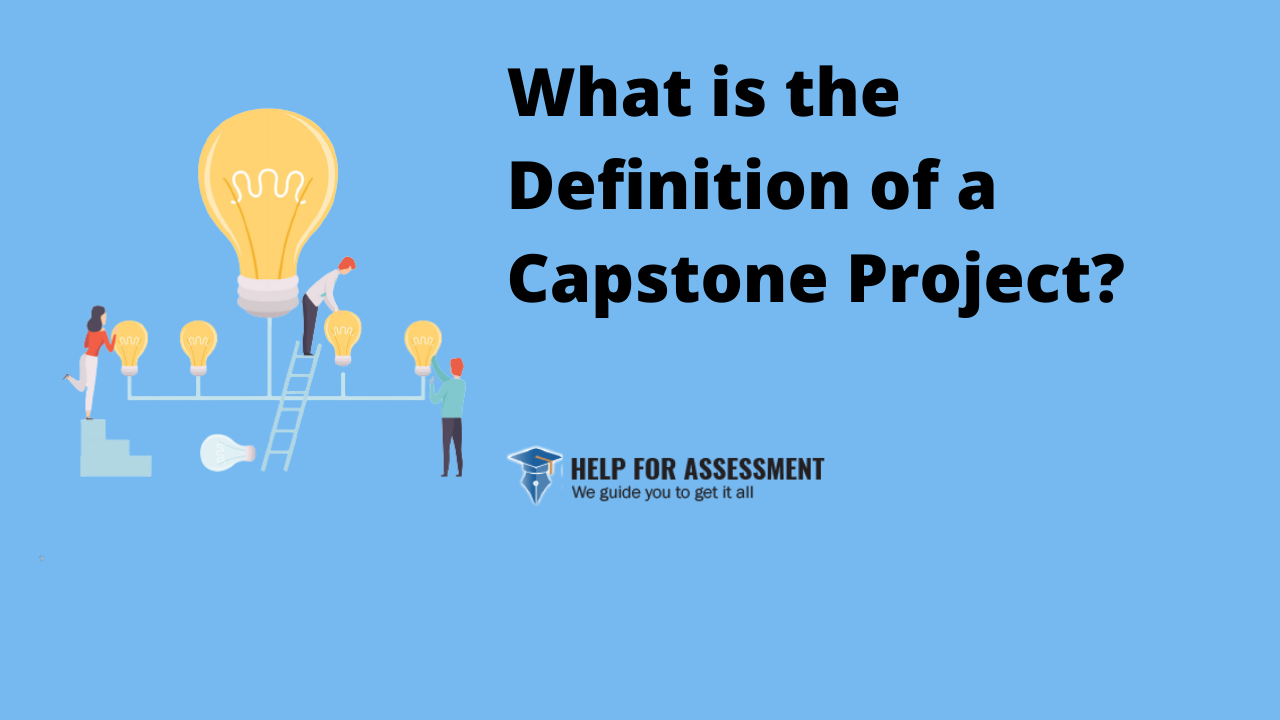
A capstone project in college is a final independent project undertaken in a program of study designed to assess the skills, knowledge, and expertise acquired by the student.
As the name suggests, it is the capstone or crowning achievement of academic life and the last class taken before graduation. It gives you the final credits required to pass the course, which is why every student must take the project.
Since it is designed to assess knowledge and skills gained in a particular discipline, capstone projects vary from school to school and discipline to discipline.
Such a project might involve something as simple as research on a topic, an evaluation of a new technique or method, development of a health program, research into a historical figure or event, or even composing a skit or theatre presentation.
No matter what kind of project you choose to undertake, the result is the same. You get to showcase your understanding of the coursework material learned and display your readiness to enter the professional world to start your career. It is a rewarding experience if done right, but can mess up your final year and possibly your graduation if you manage to mess it up.
Do you know that a successful capstone project also helps to land you lucrative jobs? That’s right, capstone projects are one of the ways potential employers find out just how learned, resourceful, and talented you are. Think of it as a kind of thesis.
Capstone projects are also called culminating projects, experience, senior exhibition, or other similar names. The project is usually self-directed, and most students find it a challenge to even come up with the right capstone project topic.
Capstone Project Vs. Thesis
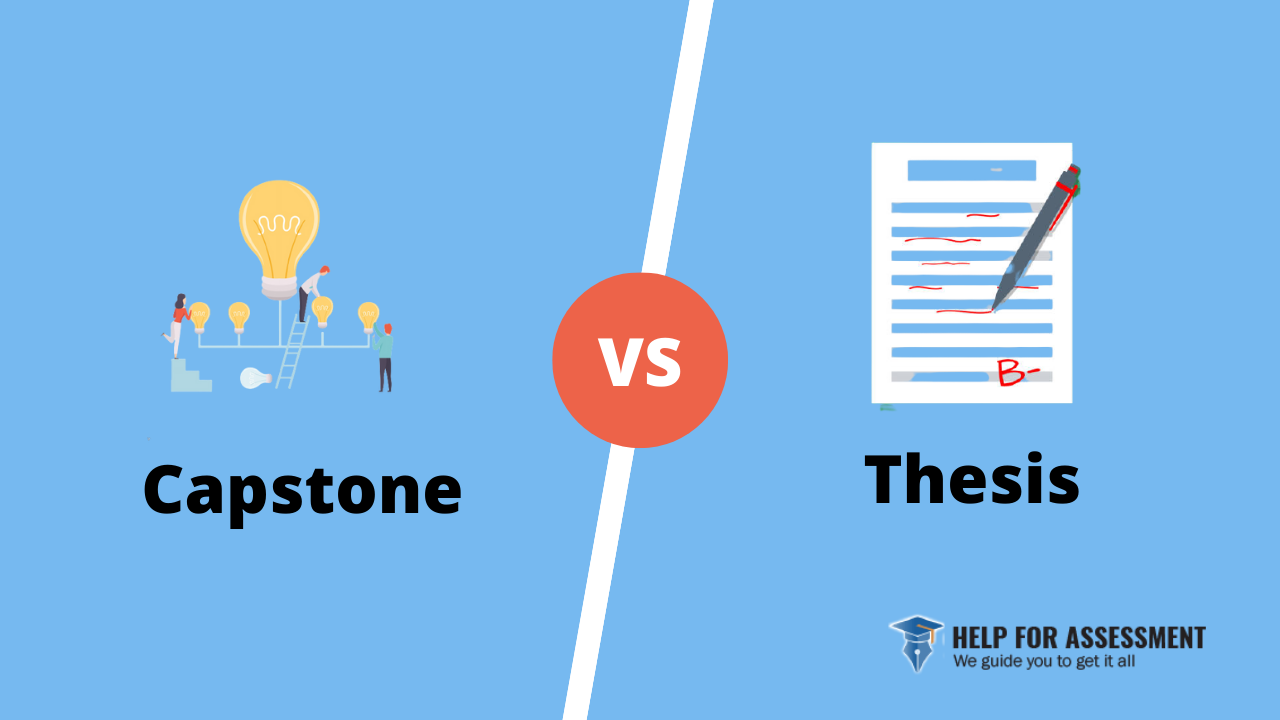
A capstone project and a thesis are both very similar in that they represent a final effort from the student just before graduation.
They are done in partial fulfillment of the requirements of the course being undertaken. The comprehensive approach and assessment involved are very similar, and sometimes the structure and methodology might overlap.
Both also have to be reviewed and approved by the institution and will remain in the public domain after publishing.
However, there are some important differences.
- A thesis is purely academic while a capstone project focuses more on the practical preparation of the student for the real world/job market.
- A thesis is guided by a research question resulting in the addition of new knowledge to the field, while a capstone project is guided by the practical importance of the project to the field.
- A thesis involves academic research and analysis, while a capstone project can be anything including a dance or film.
- A thesis is expected to be original and authentic, while a capstone project will have more loose requirements. You can borrow another person’s capstone project ideas , so long as you demonstrate your own advancement in the field.
- A capstone project will usually only have a brief write-up or report, while a thesis generates a detailed, extensive writeup.
- The final presentation of a thesis, called a defense, is meant to prove and show that you have mastered the subject. You are supposed to be a mini-expert in the field. A capstone project presentation comes off as a kind of exhibition where you showcase your project without having to defend it.
Types of Capstone Projects
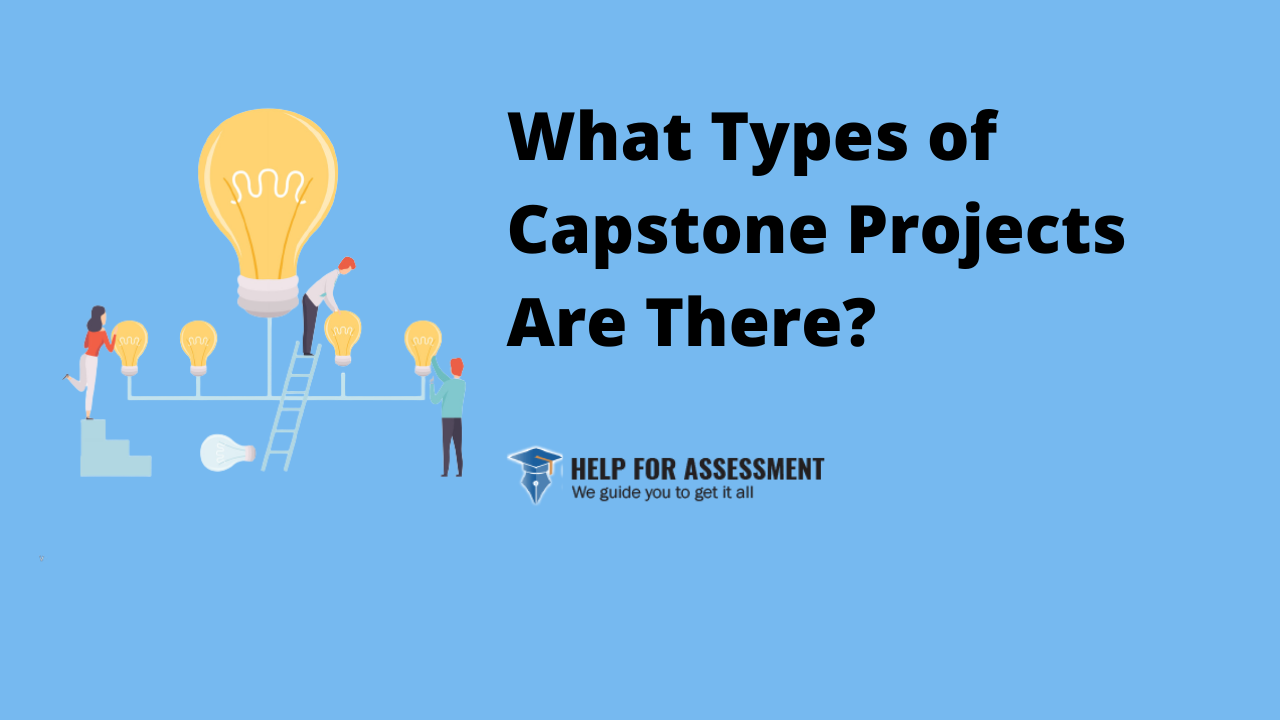
Capstone projects vary not just in the type of project, also in the level at which they are done.
There are projects for juniors and seniors in college as well as for postgraduate students.
Here are some examples of the forms of projects depending on the academic level.
- In-depth research projects.
- Developing the concept of a product, tool, or service.
- Expositions.
- Experiments.
Capstone projects can be conducted either individually or in a group.
However, the key thing is to make sure that the project proposal has been reviewed and approved by the instructor/panel/institution in charge before proceeding.
Senior Capstone Project
Senior projects are so called because they are done by high school students in their senior year.
Just like other projects, they represent a culmination of the coursework with an interdisciplinary application of knowledge and skills gained so far.
The project usually takes the better part of the final academic year and will have different parts to it, depending on the type of project chosen.
It will also require a presentation where the student(s) explain and describe the project to an audience, including their classmates.
Sample Capstone Project Outline
The write up for a project consists of several parts. However, even before starting the write-up, you need to do a few things:
- Come up with an idea for your project. What will be your subject matter, topic, or premise?
- Find sources for the project and review them beforehand to ensure that they will be of help to you.
- Come up with a step-by-step methodology for your project.
Using this information, you will then write a capstone project proposal for your project. It informs your instructor or review panel exactly what you intend to present so that they can approve or reject it.
Once approved, you can go on to the next stage. The final write-up has the following parts.
- A title page.
- Project outline.
- A description/abstract.
- Introduction
- Rationale/relevance/reason for doing the project.
- Objectives of the project.
- Procedures/methodology.
- Research and analysis.
- Evaluation of results and findings.
- Conclusion and future work/suggestions.
- Bibliography/works cited/reference list.
Note that the project is carried out in stages. Once approved, you will need to be submitting weekly or monthly status reports to your supervisor. After the project report is submitted, you will also have to make a presentation about the whole project.
This brief outline is only meant to be a rough guide. We have a much more detailed article detailing how you can do your capstone project, including a project template.
Capstone Project Examples
Help for Assessment has extensive experience when it comes to capstone projects of all kinds.
Whether it’s a high school project, a college capstone, or a senior capstone project, you can trust us to carry it out successfully for you.
You can check out various project samples here .
Get Help With Your Capstone Project
Capstone projects in every level of school are a make or break it deal. Given that they complete the graduation credits required, it makes sense to leave this important part of your coursework to experts.
We are proud to offer you a guide on how to write a capstone project here . If you need help, you can take advantage of our capstone project writing service at affordable, student-friendly rates with amazing discounts.
Check it out here and make your order to experience excellence, peace of mind, and success thanks to our stellar services.
About the author
Antony W is a professional writer and coach at Help for Assessment. He spends countless hours every day researching and writing great content filled with expert advice on how to write engaging essays, research papers, and assignments.

Capstone Research Projects
Looking for in-depth research support?
A capstone is an end-of-program applied research project where students will spend twenty hours per week, for fifteen weeks, investigating a research problem alongside an industry stakeholder. Most research capstone projects are related to machine learning, computer vision, networking, HCI, cloud computing, AI, NLP, speech recognition, or DevOps.
Depending on the problem, the project scope will include a literature review of related work, identification of methodologies to solve the problem, an exploratory set of experiments with results, a final analysis, and future work. Students will work in teams of three or four. Stakeholders can meet with students virtually or in person, typically every two weeks.
Propose a Capstone Project
Featured Projects

Khoury Social

Contact Khoury
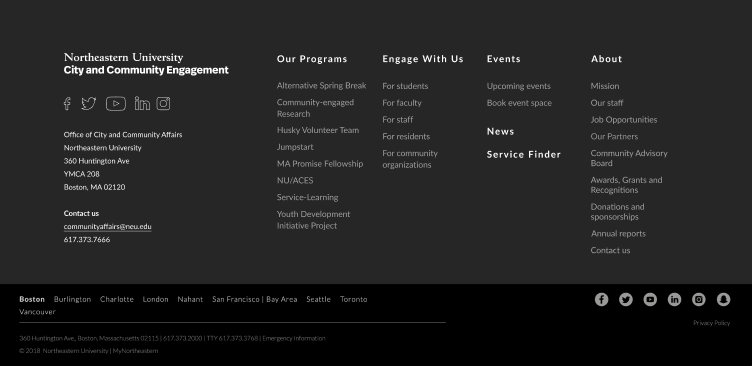
I'm seeking information for

What Is The Difference Between Capstone Project And Research Project?

Introduction
The word ‘capstone ‘ might seem confusing to you, but in simple words, capstone means ‘the high point’ or ‘completion marker’ in a student’s career. A capstone project is mainly a two-semester project that is conducted in the final year of graduation, where students are supposed to independently or collectively research their topic of interest and participate in debates on relevant topics to gain deep knowledge in the subject. The students typically complete it in their final year of graduation.
A research project is completed through careful study conducted through scientific methods and a systematic approach.
Both types of projects help the students expand their knowledge base in their respective disciplines during graduation. They also pave a path for students who want to improve their professional skills. Let’s understand the difference between a capstone project and a research project in detail.
What Is the Key Difference Between a Capstone Project and a Research Project?
To better understand the differences, you first need to know in detail what a Capstone project and a Research Project are. Read along to learn about them in detail –
What is a Capstone Project?
A capstone project focuses mainly on developing research skills in students . It helps to develop a student mindset to think critically, develop communication skills, induce feelings of the importance of teamwork in students, and many other skills that help the students to face real-world problems once they get out of college. Such skills help the students to analyze problems carefully and find solutions to them accordingly. A capstone project can be submitted in any form, i.e., it can be either a presentation or a demonstrative film, or just a file with handwritten notes in it. A capstone project acts as a final nail in the coffin that concludes a student’s academic career and helps them kickstart their professional career in a better way.
What is the purpose of a Capstone Project?
Institutions conduct capstone projects for the following reasons:
- Prepare You for the Upcoming Challenges When you participate in a capstone project, you learn about different challenges that arise in the professional world. Such projects help students to come ahead and show their decision-making and leadership skills. It helps them to come out as more responsible and well-rounded graduates.
- Teaching the Importance of Teamwork Most capstone projects are based on the collaborative participation of students. It helps the students to incorporate the feeling of teamwork and respect towards everyone in themselves, which helps them to be better people in life. Such qualities help students to climb the corporate ladder faster in this competitive space.
- Practical Experience When you step out of college and enter the professional world, recruiters first ask for work experience. Working on a capstone project provides many practical experiences which are required in the corporate world to be a successful person. Participating in a capstone project allows you to gain knowledge and teaches you how to apply that knowledge in practical fields.
- Choose the Right Profession A capstone project research is based on all the knowledge that they gain right from the start of their graduation program. This lets the students know about their interests, which helps them choose the right profession after college. It lets the learners sharpen their skills one last time before stepping out of the educational environment.
- Increase in Self-confidence Among Aspirants Capstone projects demand the long-term involvement of students and require them to take responsibility and stay committed to a certain goal. Completing such projects, which require a great amount of hard work, helps boost confidence and helps to remove the false perceptions they have made towards themselves.
What is a Research-oriented Project?
A research project stresses developing or seeking theories or proposing a thesis about the relevant topic. The research project begins with a formal study of the hypothesis about the relevant topic. Then this hypothesis is studied and tested under various conditions. From this study, students get to know about the problems in the proposed hypothesis and what can be the solutions to it. A research project may include surveys or interviews which are conducted on relevant topics and persons. On the basis of the obtained outcomes, a new theory is given in the form of a result. Since students get a chance to demonstrate their skills fully, a research project can also be included in the employment portfolio.
What is the purpose of a Research project?
A research project is aimed to fulfill the following purposes –
- Propose a Thesis on the Basis of Proper Facts and Data Research projects primarily focus on proving a hypothesis right or wrong on the basis of relevant data. This helps students to develop a research-oriented mindset.
- Get a First-hand Experience of What It Takes to Prepare a Research Paper Students first come across a research paper when they get enrolled in their graduation course. Such projects aim at teaching the students the amount of effort and time that has been put into such research papers.
- To Provide In-depth Knowledge of a Subject Research projects are generally conducted on subjects that require in-depth understanding, which helps the students better grasp the topic through self-thesis. Such projects help to develop curiosity among students regarding the subject.
- To Develop Problem-solving Skills in Students. One of the aims of research-oriented projects is to find flaws in the given theory and find optimal solutions to them. It helps the students to develop skills to tackle any problem they come across.
- Give a New Trajectory to Thinking Research projects aim to develop students’ thinking so they can learn to find multiple ways to look at any scenario they come across. This further helps in developing problem-solving skills.
Difference Between A Capstone Project And A Mini Project
Both project types have their own pros and cons. Let’s discuss!
- Research projects focus more on developing or proposing theories, whereas capstone projects focus more on achieving tangible or intangible results through research.
- Since a capstone project is meant to be completed in the final year of graduation, it is much less time-consuming when compared to a Research oriented project. Research projects require students to put in greater amounts of knowledge, time, and effort in comparison to a capstone project.
- A capstone project, though, is not a necessity for students who want to pursue their career in a related topic; it helps them to develop skills that can help them to build a good career in the subject . But to become an expert in the field , one must have done enough research on it, which can be done by accomplishing a research project on a suitable subject.
- A research project tests the level of effort a student is ready to put into a particular topic. It tests their patience level as well as their hunger for knowledge in the particular subject, whereas a capstone project focuses primarily on developing skills in the relevant subject in students that would help them to face real-world scenarios after graduation.
What are the Benefits of a Capstone Project?
Capstone projects provide you with many benefits in academic as well as professional fields.
Some of them are mentioned below:
- Since topics for a capstone project are generally based on the curriculum of your graduation program, properly preparing a capstone project will help boost your college preparedness.
- Capstone projects help to increase the skills and knowledge of learners. This gives you a competitive edge over other graduates who don’t participate in such projects in the corporate world.
- Capstone projects prove to be setting stones in your professional career. They help you build your employment portfolio. These projects help you to understand your job skills better and let you know a deeper knowledge of these skills. A better knowledge of your skills helps you in choosing the right path for your career development.
- It helps in improving research-making skills. Having good research-making skills makes you stand out from the crowd and open better opportunities for you in the future.
What are the Benefits of a Research Project?
Research projects aim at indulging qualities like patience, hard work, etc., in the learners, which prove to be beneficiary in the future. Apart from these, you can also avail many benefits through such projects.
- Research helps expand your knowledge base, which can be super beneficial in your academics and the professional world.
- When you work on a research project, you have a tendency to stay updated with the latest and most accurate information. This habit prevents you from lagging behind your competitors.
- You need to be serious when you are working on a research project. These projects help to build up seriousness in you towards your goal. Also, it increases your credibility as a graduate among your colleagues.
- When you have enough knowledge about anything, you get an inner boost of confidence. Research projects help you gain in-depth knowledge of a subject, which helps you present yourself properly in front of others.
Conclusion
We hope you understand capstone project meaning now. Such projects are conducted during the final year of graduate programs and focus on developing skills like research-making in a student, which would benefit them when they are ready to move out of college and face real-world challenges. Not all colleges conduct capstone projects. Some schools make them mandatory only at certain degree levels or majors.
Research projects that are generally more time-consuming than capstone projects target the development of skills like open mindset and decision-making.
Both types of projects help a student excel in their academics as well as in the professional world. These projects test a student in every aspect in such a manner that they can easily become part of anyone’s professional portfolio.
These projects help students develop the necessary skills to survive in this competitive space. Undoubtedly, these projects require an individual to do a lot of hard work and research, and the benefits you can avail yourself through them are good enough to open immense opportunities for you in the future. For more information on projects, visit the UNext Jigsaw .
Fill in the details to know more
PEOPLE ALSO READ

Related Articles

How To Use the Pivot Table in Excel ?
May 12, 2023
Role of Cost in Pricing of the Product!
April 18, 2023

What Is Data Visualization in Excel?
April 14, 2023

What Are Databases and Tables in SQL?
March 24, 2023

It’s Raining Opportunities In Cloud Computing!
March 23, 2023
Product Management – With Great Power Comes Great Responsibility!
Are you ready to build your own career?
Query? Ask Us
Enter Your Details ×
- University of Notre Dame
- Blog Network
Notes on Teaching and Learning
Shutting Down on 1/6/2022 – New Posts are at Learning.ND.edu
Beyond the Research Paper: Redesigning the Capstone Project
Oct 5th, 2020 by Dominique
As we approach what would have been Fall break in a typical semester, many of us–students, faculty, and staff alike–are starting to feel like we’ve hit a physical and emotional wall . Burnout and fatigue are common to any semester, but COVID has exacerbated these conditions. Acknowledging burnout at mid-semester poses interesting challenges and opportunities looking ahead to pre-Thanksgiving finals . If your course ends with a long research paper, you may be considering ways to simplify or refocus while maintaining rigor and effective evaluation. Redesigning the research assignment can help students to pace themselves and also manage our end of semester workload.
Why consider alternative research assignments?
The research paper has its own rhetorical components and methods that make it an important genre for undergraduate students to learn and practice. If course goals prioritize generic components like discipline-specific argumentation, or if your course requires a minimum page count, then research papers are natural and necessary modes of assessment. However, the research paper assignment also has other goals that are not bound to the genre . If your goals focus on the demonstration of foundational research skills, communication, synthesis and/or critical thinking, you could consider alternative capstone assignments.
Alternatives can:
- lighten the grading load
- scaffold the skills and strategies necessary for writing complex arguments
- develop and diversify student strengths and interests
- expose students to different voices and modes of communication
- help students to experiment with audience beyond their professor
How to create an alternative research assignment?
Standard research paper outcomes include research, argumentation, understanding of content, incorporation of evidence, citation, and synthesis. Think outside of the box and consider other outcomes that may assess the students’ abilities. Be sure to prioritize and connect assignment to course goals and consider the problems, skills, or knowledge the assignment will address. Consider devoting short segments of class time to tasks that will help students develop the skills necessary to complete the assignment. Call on colleagues, librarians, and/or technical experts to brainstorm alternative assignments. Remember: if you change anything in the course, be transparent with students about your reasons for doing so and make your evaluation criteria clear.
Sample alternative assignments:
- All-but-the-paper term paper: students complete every step in the research paper process and then write the introductory and concluding pages, a detailed outline of the body, an annotated bibliography, and an abstract
- Put on a class conference complete with poster sessions, panels, papers, etc. and let students choose how they will present research
- Summarize the literature on a topic and present the findings
- Create an anthology of readings complete with an introduction and reading summaries
- Create, judge, and “fund” research proposals
- Annotate an article for a novice reader
- Create an advertisement
- Analyze and respond to a case study
- Create an infographic
- Explanation of a multiple-choice answer: students must explain why the answer they chose to a multiple-choice question is correct, or why the alternative answers are wrong
- Meaningful paragraph: given a list of specific terms, students must use the terms in a paragraph that demonstrates that they understand the terms and their interconnections
- Curate a portfolio to demonstrate evolution of work and thinking over time
As we begin the uphill push to the end of the semester, we can also think ahead to next semester and take stock of strategies that successfully motivate student learning and engagement under these unique circumstances. Above all, let’s continue to be patient and creative in pacing student work and assessment.
References & Additional Reading:
“ Tip: Research Paper Alternatives ,” Tips for Teaching Professors “ Alternatives to to Traditional Exams and Papers ,” Center for Innovative Teaching and Learning IU Bloomington “ Library Assignments / Research Paper Alternatives ,” Carson-Newman University “ Alternatives to Research Papers ,” University of Connecticut “ Alternatives to the Research Paper ,” Muhlenberg College Video Interview on UDL Assessment , Centre for Academic and Faculty Enrichment (CAFE) at Durham College Remix Multimedia Resources , Hesburgh Libraries and the Kaneb Center for Teaching and Learning
Posted in Uncategorized
Comments are closed.
If you have questions about a topic related to teaching or learning, please email [email protected] or call 631-9146.
- Search for:
Related Sites
Kaneb Center – home page Notre Dame Learning
- February 2021
- December 2020
- November 2020
- October 2020
- September 2020
- August 2020
- February 2020
- January 2020
- December 2019
- November 2019
- October 2019
- September 2019
- August 2019
- February 2019
- January 2019
- November 2018
- October 2018
- September 2018
- August 2018
- February 2018
- January 2018
- December 2017
- November 2017
- October 2017
- September 2017
- August 2017
- February 2017
- January 2017
- December 2016
- November 2016
- October 2016
- September 2016
- August 2016
- February 2016
- January 2016
- December 2015
- November 2015
- October 2015
- September 2015
- August 2015
- February 2015
- January 2015
- December 2014
- November 2014
- October 2014
- September 2014
- August 2014
- February 2014
- January 2014
- December 2013
- November 2013
- October 2013
- September 2013
- February 2013
- January 2013
- November 2012
- October 2012
- September 2012
- August 2012
- February 2012
- January 2012
- January 2011
- November 2010
- September 2010
- August 2010
Notes on Teaching and Learning © 2024 All Rights Reserved.
Free WordPress Themes

Online Students
For All Online Programs

International Students
On Campus, need or have Visa
Campus Students
For All Campus Programs
What is a Capstone Project in College?

The capstone project in college is the apogee, or completion marker, of a student's coursework leading to the culmination of their program with a degree in their chosen field of study. The original definition of a capstone focuses on the actual stone placed at the top of a wall or building, marking the successful completion of the structure. It's a significant and celebrated piece of architecture, considered to be the most important of an entire construction project.
"(Capstone projects are) the apex of all a student's work done throughout their college career," said Dr. Jeff Czarnec , a social sciences adjunct online and on-campus at Southern New Hampshire University (SNHU). Retired after 23 years in law enforcement, Czarnec served as an associate dean of criminal justice and social sciences at SNHU for nearly a decade. He now leverages his extensive background to teach social sciences, enriching the academic experience with his practical insights.
When entering a capstone course, there's an expectation that you have all the necessary skills and knowledge to be successful.

You have the opportunity to pick a research topic that is of interest to you and run with it. "After having to write research papers in all of their courses prior to (the capstone), the task is not one to dread, but to enjoy. It is their time to shine as students and to enjoy the journey," MacCarty said.
A capstone course is more than a potential degree requirement. It can serve as an opportunity to demonstrate knowledge mastery and creative thinking, which may help you stand out to potential employers.
What is Involved in a Capstone Project?

Each university, program and instructor may have different requirements — or models — for a capstone project. According to Czarnec, a general design might first include selecting a topic of interest that the instructor will approve.
Czarnec said that, depending on the program, a capstone may include anything from a video presentation or an architectural model to an art exhibit or short film; however, it almost always includes a paper demonstrating an introduction, theory, evaluation, research and individual issues relevant to the proposal.
"Students are expected to be ready to enter the world as professionals in their field upon completion of the capstone course," said MacCarty.
The time it takes to complete a capstone project usually depends on the course's length. If you're in an undergraduate online program at SNHU, for instance, your capstone course would take eight weeks to complete, Czarnec said.
Capstone courses are research-based, and you can choose your topic early on, allowing you more freedom to conduct research independently. Capstone topics usually align with a program's specific disciplines, too.
For example, in the social sciences realm, "our focus is on human behavior and cognition, which may be different from a capstone course in business or STEM," MacCarty said.
Find Your Program
Types of capstones.
There are many types of capstone projects that you could consider, and they vary from learner to learner, Czarnec said. "Some will investigate issues or phenomenon that they are familiar with either professionally, personally or courtesy of a discipline-related source, such (as) a police or human services agency," he said.
In a nutshell, a rough outline of a capstone, according to Czarnec, may look something like this:
- Select a topic and have it approved by the instructor
- Evaluate relevance to the proposal
- Perform necessary research
- Present results in the agreed-upon fashion
Czarnec said that if you're looking for a capstone topic, you may consider focusing on an area you're passionate about or you could also try to ask you instructor for some assistance. For example, Czarnec said that he can act as a guide, mentor, editor and research resource for his students to help them focus and narrow their search for a capstone topic.
Are Capstone Projects Difficult?
"Not necessarily," said Czarnec. "It does force you to be efficient and very specific to topic. No fluff. Straight forward. Razor sharp."
The capstone is more of an opportunity to catch your breath, he said, and to retrace and pull up what you have learned in a more stress-free environment .
"It helps validate students as learners," Czarnec said.
Depending on the major and course requirements, there may be opportunities to connect with outside contacts, not only to assist with the capstone project research and problem statement but also to provide a networking community .
"Not every research project is, nor should they be, the same," Czarnec said. "Everyone has a different approach."
What is the Difference Between a Thesis and a Capstone Project?
A capstone is similar to a thesis in that the starting point involves the strengths needed for a thesis or dissertation work. For example, you may need to consider the skeletal structure of research and form your theory, hypothesis and problem statement.
"While a capstone is certainly a scholarly piece of work and does share some aspects of a thesis, the time and detail that is required of a master's thesis is greater," MacCarty said.
A capstone paper may be 25 pages, whereas a thesis could be 100 or more. If you choose to further your education beyond a bachelor's degree, the capstone project could be an invaluable tool in preparing for a graduate thesis.
Capstone Projects are About Your Success
Capstones of all programs are leading you to the end game, Czarnec said. The goal is to develop you into a well-rounded thinker who can pull their work together in a coherent, articulate, well-organized fashion while considering the demands of the profession or vocation you're interested in.
The focus and intent of a capstone should be to create an effective device to assess and measure all that you've learned throughout your program in an aggregate fashion so you can demonstrate your life-long vocational skills in a nice, neat package.
"My goal is for students to leave the program confident about their skills and abilities," said Czarnec.
MacCarty said that capstone courses should be structured to support your success in fulfilling program requirements and allow you the opportunity to showcase your academic abilities and skills gained throughout your degree program.
A degree can change your life. Choose your program from 200+ SNHU degrees that can take you where you want to go.
Laurie Smith '14 is a writer, editor and communications specialist. Connect with her on LinkedIn .
Explore more content like this article

How to Survive High School and Prepare for College

How Long Does it Take to Get an Associate Degree?

How to Get a Master's Degree
About southern new hampshire university.

SNHU is a nonprofit, accredited university with a mission to make high-quality education more accessible and affordable for everyone.
Founded in 1932, and online since 1995, we’ve helped countless students reach their goals with flexible, career-focused programs . Our 300-acre campus in Manchester, NH is home to over 3,000 students, and we serve over 135,000 students online. Visit our about SNHU page to learn more about our mission, accreditations, leadership team, national recognitions and awards.
Capstone and PICO Project Toolkit
- Starting a Project: Overview
- Developing a Research Question
- Selecting Databases
- Expanding a Search
- Refining/Narrowing a Search
- Saving Searches
- Critical Appraisal & Levels of Evidence
- Citing & Managing References
- Database Tutorials
- Types of Literature Reviews
- Finding Full Text
- Term Glossary
Choosing a Review Type
For guidance related to choosing a review type, see:
- "What Type of Review is Right for You?" - Decision Tree (PDF) This decision tree, from Cornell University Library, highlights key difference between narrative, systematic, umbrella, scoping and rapid reviews.
- Reviewing the literature: choosing a review design Noble, H., & Smith, J. (2018). Reviewing the literature: Choosing a review design. Evidence Based Nursing, 21(2), 39–41. https://doi.org/10.1136/eb-2018-102895
- What synthesis methodology should I use? A review and analysis of approaches to research synthesis Schick-Makaroff, K., MacDonald, M., Plummer, M., Burgess, J., & Neander, W. (2016). What synthesis methodology should I use? A review and analysis of approaches to research synthesis. AIMS Public Health, 3 (1), 172-215. doi:10.3934/publichealth.2016.1.172 More information less... ABSTRACT: Our purpose is to present a comprehensive overview and assessment of the main approaches to research synthesis. We use "research synthesis" as a broad overarching term to describe various approaches to combining, integrating, and synthesizing research findings.
- Right Review - Decision Support Tool Not sure of the most suitable review method? Answer a few questions and be guided to suitable knowledge synthesis methods. Updated in 2022 and featured in the Journal of Clinical Epidemiology 10.1016/j.jclinepi.2022.03.004
Types of Evidence Synthesis / Literature Reviews
Literature reviews are are comprehensive summaries and syntheses of the previous research on a given topic. While narrative reviews are common across all academic disciplines, reviews that focus on appraising and synthesizing research evidence are increasingly important in the health and social sciences.
Most evidence synthesis methods use formal and explicit methods to identify, select and combine results from multiple studies, making evidence synthesis a form of meta-research.
The review purpose, methods used and the results produced vary among different kinds of literature reviews; some of the common types of literature review are detailed below.
Common Types of Literature Reviews 1
Narrative (literature) review.
- A broad term referring to reviews with a wide scope and non-standardized methodology
- Search strategies, comprehensiveness of literature search, time range covered and method of synthesis will vary and do not follow an established protocol
Integrative Review
- A type of literature review based on a systematic, structured literature search
- Often has a broadly defined purpose or review question
- Seeks to generate or refine and theory or hypothesis and/or develop a holistic understanding of a topic of interest
- Relies on diverse sources of data (e.g. empirical, theoretical or methodological literature; qualitative or quantitative studies)
Systematic Review
- Systematically and transparently collects and categorize existing evidence on a question of scientific, policy or management importance
- Follows a research protocol that is established a priori
- Some sub-types of systematic reviews include: SRs of intervention effectiveness, diagnosis, prognosis, etiology, qualitative evidence, economic evidence, and more.
- Time-intensive and often takes months to a year or more to complete
- The most commonly referred to type of evidence synthesis; sometimes confused as a blanket term for other types of reviews
Meta-Analysis
- Statistical technique for combining the findings from disparate quantitative studies
- Uses statistical methods to objectively evaluate, synthesize, and summarize results
- Often conducted as part of a systematic review
Scoping Review
- Systematically and transparently collects and categorizes existing evidence on a broad question of scientific, policy or management importance
- Seeks to identify research gaps, identify key concepts and characteristics of the literature and/or examine how research is conducted on a topic of interest
- Useful when the complexity or heterogeneity of the body of literature does not lend itself to a precise systematic review
- Useful if authors do not have a single, precise review question
- May critically evaluate existing evidence, but does not attempt to synthesize the results in the way a systematic review would
- May take longer than a systematic review
Rapid Review
- Applies a systematic review methodology within a time-constrained setting
- Employs methodological "shortcuts" (e.g., limiting search terms and the scope of the literature search), at the risk of introducing bias
- Useful for addressing issues requiring quick decisions, such as developing policy recommendations
Umbrella Review
- Reviews other systematic reviews on a topic
- Often defines a broader question than is typical of a traditional systematic review
- Most useful when there are competing interventions to consider
1. Adapted from:
Eldermire, E. (2021, November 15). A guide to evidence synthesis: Types of evidence synthesis. Cornell University LibGuides. https://guides.library.cornell.edu/evidence-synthesis/types
Nolfi, D. (2021, October 6). Integrative Review: Systematic vs. Scoping vs. Integrative. Duquesne University LibGuides. https://guides.library.duq.edu/c.php?g=1055475&p=7725920
Delaney, L. (2021, November 24). Systematic reviews: Other review types. UniSA LibGuides. https://guides.library.unisa.edu.au/SystematicReviews/OtherReviewTypes
Further Reading: Exploring Different Types of Literature Reviews
- A typology of reviews: An analysis of 14 review types and associated methodologies Grant, M. J., & Booth, A. (2009). A typology of reviews: An analysis of 14 review types and associated methodologies. Health Information and Libraries Journal, 26 (2), 91-108. doi:10.1111/j.1471-1842.2009.00848.x More information less... ABSTRACT: The expansion of evidence-based practice across sectors has lead to an increasing variety of review types. However, the diversity of terminology used means that the full potential of these review types may be lost amongst a confusion of indistinct and misapplied terms. The objective of this study is to provide descriptive insight into the most common types of reviews, with illustrative examples from health and health information domains.
- Clarifying differences between review designs and methods Gough, D., Thomas, J., & Oliver, S. (2012). Clarifying differences between review designs and methods. Systematic Reviews, 1 , 28. doi:10.1186/2046-4053-1-28 More information less... ABSTRACT: This paper argues that the current proliferation of types of systematic reviews creates challenges for the terminology for describing such reviews....It is therefore proposed that the most useful strategy for the field is to develop terminology for the main dimensions of variation.
- Are we talking the same paradigm? Considering methodological choices in health education systematic review Gordon, M. (2016). Are we talking the same paradigm? Considering methodological choices in health education systematic review. Medical Teacher, 38 (7), 746-750. doi:10.3109/0142159X.2016.1147536 More information less... ABSTRACT: Key items discussed are the positivist synthesis methods meta-analysis and content analysis to address questions in the form of "whether and what" education is effective. These can be juxtaposed with the constructivist aligned thematic analysis and meta-ethnography to address questions in the form of "why." The concept of the realist review is also considered. It is proposed that authors of such work should describe their research alignment and the link between question, alignment and evidence synthesis method selected.
- Meeting the review family: Exploring review types and associated information retrieval requirements Sutton, A., Clowes, M., Preston, L., & Booth, A. (2019). Meeting the review family: Exploring review types and associated information retrieval requirements. Health Information & Libraries Journal, 36(3), 202–222. doi: 10.1111/hir.12276
Integrative Reviews
"The integrative review method is an approach that allows for the inclusion of diverse methodologies (i.e. experimental and non-experimental research)." (Whittemore & Knafl, 2005, p. 547).
- The integrative review: Updated methodology Whittemore, R., & Knafl, K. (2005). The integrative review: Updated methodology. Journal of Advanced Nursing, 52 (5), 546–553. doi:10.1111/j.1365-2648.2005.03621.x More information less... ABSTRACT: The aim of this paper is to distinguish the integrative review method from other review methods and to propose methodological strategies specific to the integrative review method to enhance the rigour of the process....An integrative review is a specific review method that summarizes past empirical or theoretical literature to provide a more comprehensive understanding of a particular phenomenon or healthcare problem....Well-done integrative reviews present the state of the science, contribute to theory development, and have direct applicability to practice and policy.
- Conducting integrative reviews: A guide for novice nursing researchers Dhollande, S., Taylor, A., Meyer, S., & Scott, M. (2021). Conducting integrative reviews: A guide for novice nursing researchers. Journal of Research in Nursing, 26(5), 427–438. https://doi.org/10.1177/1744987121997907
- Rigour in integrative reviews Whittemore, R. (2007). Rigour in integrative reviews. In C. Webb & B. Roe (Eds.), Reviewing Research Evidence for Nursing Practice (pp. 149–156). John Wiley & Sons, Ltd. https://doi.org/10.1002/9780470692127.ch11
Scoping Reviews
Scoping reviews are evidence syntheses that are conducted systematically, but begin with a broader scope of question than traditional systematic reviews, allowing the research to 'map' the relevant literature on a given topic.
- Scoping studies: Towards a methodological framework Arksey, H., & O'Malley, L. (2005). Scoping studies: Towards a methodological framework. International Journal of Social Research Methodology, 8 (1), 19-32. doi:10.1080/1364557032000119616 More information less... ABSTRACT: We distinguish between different types of scoping studies and indicate where these stand in relation to full systematic reviews. We outline a framework for conducting a scoping study based on our recent experiences of reviewing the literature on services for carers for people with mental health problems.
- Scoping studies: Advancing the methodology Levac, D., Colquhoun, H., & O'Brien, K. K. (2010). Scoping studies: Advancing the methodology. Implementation Science, 5 (1), 69. doi:10.1186/1748-5908-5-69 More information less... ABSTRACT: We build upon our experiences conducting three scoping studies using the Arksey and O'Malley methodology to propose recommendations that clarify and enhance each stage of the framework.
- Methodology for JBI scoping reviews Peters, M. D. J., Godfrey, C. M., McInerney, P., Baldini Soares, C., Khalil, H., & Parker, D. (2015). The Joanna Briggs Institute reviewers’ manual: Methodology for JBI scoping reviews [PDF]. Retrieved from The Joanna Briggs Institute website: http://joannabriggs.org/assets/docs/sumari/Reviewers-Manual_Methodology-for-JBI-Scoping-Reviews_2015_v2.pdf More information less... ABSTRACT: Unlike other reviews that address relatively precise questions, such as a systematic review of the effectiveness of a particular intervention based on a precise set of outcomes, scoping reviews can be used to map the key concepts underpinning a research area as well as to clarify working definitions, and/or the conceptual boundaries of a topic. A scoping review may focus on one of these aims or all of them as a set.
Systematic vs. Scoping Reviews: What's the Difference?
YouTube Video 4 minutes, 45 seconds
Rapid Reviews
Rapid reviews are systematic reviews that are undertaken under a tighter timeframe than traditional systematic reviews.
- Evidence summaries: The evolution of a rapid review approach Khangura, S., Konnyu, K., Cushman, R., Grimshaw, J., & Moher, D. (2012). Evidence summaries: The evolution of a rapid review approach. Systematic Reviews, 1 (1), 10. doi:10.1186/2046-4053-1-10 More information less... ABSTRACT: Rapid reviews have emerged as a streamlined approach to synthesizing evidence - typically for informing emergent decisions faced by decision makers in health care settings. Although there is growing use of rapid review "methods," and proliferation of rapid review products, there is a dearth of published literature on rapid review methodology. This paper outlines our experience with rapidly producing, publishing and disseminating evidence summaries in the context of our Knowledge to Action (KTA) research program.
- What is a rapid review? A methodological exploration of rapid reviews in Health Technology Assessments Harker, J., & Kleijnen, J. (2012). What is a rapid review? A methodological exploration of rapid reviews in Health Technology Assessments. International Journal of Evidence‐Based Healthcare, 10 (4), 397-410. doi:10.1111/j.1744-1609.2012.00290.x More information less... ABSTRACT: In recent years, there has been an emergence of "rapid reviews" within Health Technology Assessments; however, there is no known published guidance or agreed methodology within recognised systematic review or Health Technology Assessment guidelines. In order to answer the research question "What is a rapid review and is methodology consistent in rapid reviews of Health Technology Assessments?", a study was undertaken in a sample of rapid review Health Technology Assessments from the Health Technology Assessment database within the Cochrane Library and other specialised Health Technology Assessment databases to investigate similarities and/or differences in rapid review methodology utilised.
- Rapid Review Guidebook Dobbins, M. (2017). Rapid review guidebook. Hamilton, ON: National Collaborating Centre for Methods and Tools.
- NCCMT Summary and Tool for Dobbins' Rapid Review Guidebook National Collaborating Centre for Methods and Tools. (2017). Rapid review guidebook. Hamilton, ON: McMaster University. Retrieved from http://www.nccmt.ca/knowledge-repositories/search/308
- << Previous: Database Tutorials
- Next: Finding Full Text >>
- Last Updated: Apr 9, 2024 12:09 PM
- URL: https://guides.nyu.edu/pico

Want to create or adapt books like this? Learn more about how Pressbooks supports open publishing practices.
Private: Research Forms, Functions, and Skills
4 The Peer Review Process
The peer review process is central to research writing. Research projects must undergo peer review before publication. The process requires a review of the project draft by a scholar knowledgeable in the discipline or field. The peer review is conducted and feedback is provided to the author. The author revises the work based on the feedback, submits it for additional review, and the process continues until the project is publication-ready.
The peer review process leads to the acceptance of a research project within the discipline. Essentially, those knowledgeable in the discipline provide approval of the research process and publication. This approval gives the research work credibility and validation as belonging among other published education research literature. Peer reviewers essentially endorse the work, so their reputation is at stake. Reviewers provide feedback to communicate where the work needs revision to be “ endorsement worthy .” Researchers respect the process of peer review knowing that their work is legitimized and endorsed by experts in the discipline.
One of the most difficult activities in the peer review process is receiving feedback. Novice researchers often find the feedback harsh and difficult to accept. This is a very common phenomenon, but understanding the role feedback plays in the process can lessen the impact. The feedback provided is intended to focus the author on issues, errors, and how to improve the writing of the research document. Similar to physical therapy, exercises needed to improve a physical malady are rarely enjoyable but are a much needed part of the healing process.
Many researchers have difficulty seeing their writing objectively. The ability of a reviewer to view a work objectively and provide feedback is a valuable part of the peer review process. Think of the process this way, the researcher does not have to write a perfect draft the first time. There is freedom in writing your thoughts without worrying about perfection. This process allows the writer to draft, knowing the reviewer will provide ways to improve the work. However, this does not mean a reviewer will write your document, only facilitate you in improving the writing. Embracing the feedback provided by reviewers is a key skill needed for successful research writing.
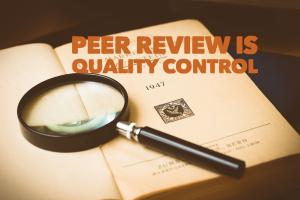
Graduate research projects usually have one to three reviewers providing feedback to the student. Literature reviews and thesis projects tend to have one reviewer, which is the instructor for the course. Dissertations generally have three reviewers, known as the dissertation committee. In some institutions, the dissertation committee has five members. Capstone projects typically have one to three reviewers. For all types of research projects, the reviewers provide essential feedback needed by the author to revise the work appropriately to meet discipline and institutional standards.
Capstone Projects in Education: Learning the Research Story Copyright © 2023 by Kimberly Chappell and Greg I. Voykhansky is licensed under a Creative Commons Attribution-NonCommercial-ShareAlike 4.0 International License , except where otherwise noted.
Departments
- Applied Physics
- Biomedical Engineering
- Center for Urban Science and Progress
- Chemical and Biomolecular Engineering
- Civil and Urban Engineering
- Computer Science and Engineering
- Electrical and Computer Engineering
- Finance and Risk Engineering
- Mathematics
- Mechanical and Aerospace Engineering
- Technology, Culture and Society
- Technology Management and Innovation
Degrees & Programs
- Bachelor of Science
- Master of Science
- Doctor of Philosophy
- Digital Learning
- Certificate Programs
- NYU Tandon Bridge
- Undergraduate
- Records & Registration
- Digital Learning Services
- Teaching Innovation
- Explore NYU Tandon
- Year in Review
- Strategic Plan
- Diversity & Inclusion
News & Events
- Social Media
Looking for News or Events ?
Capstone Projects at CUSP
Impact the cities of today and tomorrow
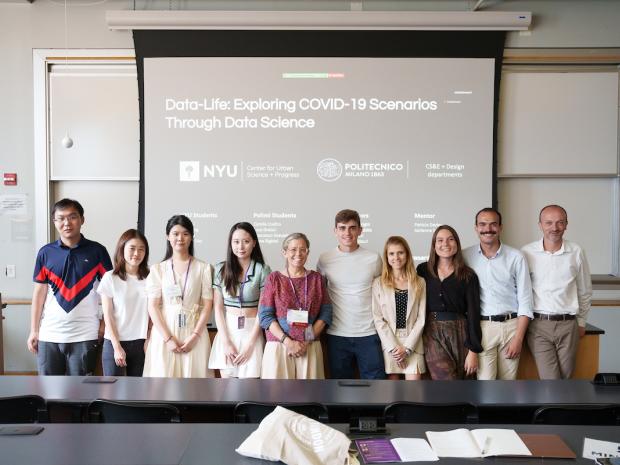
Related Links
On this page.
NYU Tandon’s Center for Urban Science + Progress (CUSP) is proud to host its annual Capstone Program to serve its mission of finding data-driven solutions to increasingly complex urban challenges.
Each year, graduate students in the MS in Applied Urban Science & Informatics degree partner with sponsors and CUSP faculty members to collaborate on a two-semester project that seeks to address a critical urban issue or research problem. Project proposal applications for the 2024-25 cycle are due April 12.
How Does it Work?
It all starts with a question. Do you have a research problem or data-driven project that you’d like a little help with? Do you need access to both data science skills and deep policy knowledge to find a scalable solution? CUSP accepts project proposals from sponsors such as government agencies, private companies, academic institutions, think tanks, startups, nonprofits, NYU faculty members–anyone who is also on a mission to make cities more equitable, efficient, livable, and technologically advanced. If accepted into the program, sponsors are paired with a team of three to five graduate students and a CUSP faculty advisor to embark on an intensive project spanning two semesters. Similar to CUSP's research activity, capstone projects must fit inside one of our main focus areas: urban health, urban environment, or urban infrastructure.
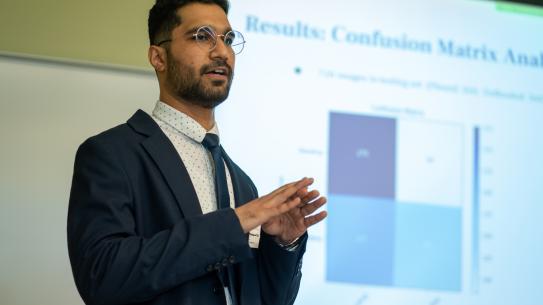
Project Details
Capstone projects approach real-world urban challenges through problem identification and scoping, data collection, and applying data analytics and visualization techniques. Typical deliverables include urban data analytic reports, data visualizations including interactive applications, research websites, research publications, and prescriptive policy solutions.
The capstone program is the pinnacle of CUSP graduate students’ hands-on experience and is tied to required Urban Science Intensive I & II courses in the fall and spring semesters of their second year. Therefore, it is important that any potential sponsor is prepared to meet with their student team on a recurring basis and to provide support as needed.
The best capstone projects are impact-driven and include a coherent, well-defined urban problem. An effective capstone project:
- Ties directly to the needs of the sponsor organization as well as CUSP’s mission;
- Identifies a discrete, tangible, and deliverable end product that can provide actionable insight;
- Is quantitative and can be approached using a range of data science and informatics methodologies (e.g. network analysis, predictive modeling, machine learning, spatial analytics, etc.);
- Requires data that is available and in-hand prior to the start of a project; and
- Includes a supportive sponsor that will engage with the students, ensure access to necessary information, and assist with connecting student teams to appropriate experts and stakeholders.
Project Timeline
Dates listed below are estimated and are subject to change.
- April 12, 2024: Deadline for sponsors to submit project proposals .
- May 15, 2024: 2024-25 Capstone projects and sponsors announced.
- August 15, 2024: Deadline for sponsors to submit data to be used in projects.
- September 4, 2024: First day of Urban Science Intensive I class.
- September 9-13, 2024: Meet and greet events between project sponsors, mentors, and students (virtual meetings permitted).
- September 13, 2024: Deadline for students to submit preferences for project assignments.
- September 25, 2024: Student team + sponsor matches to be announced.
- December TBD, 2024: Spring milestone updates/presentations.
- April TBD, 2025: Final deliverables due; Capstone presentations will be given at the Applied Urban Science Conference.
Faculty Mentors
Meet the faculty mentors who make our capstone projects possible.
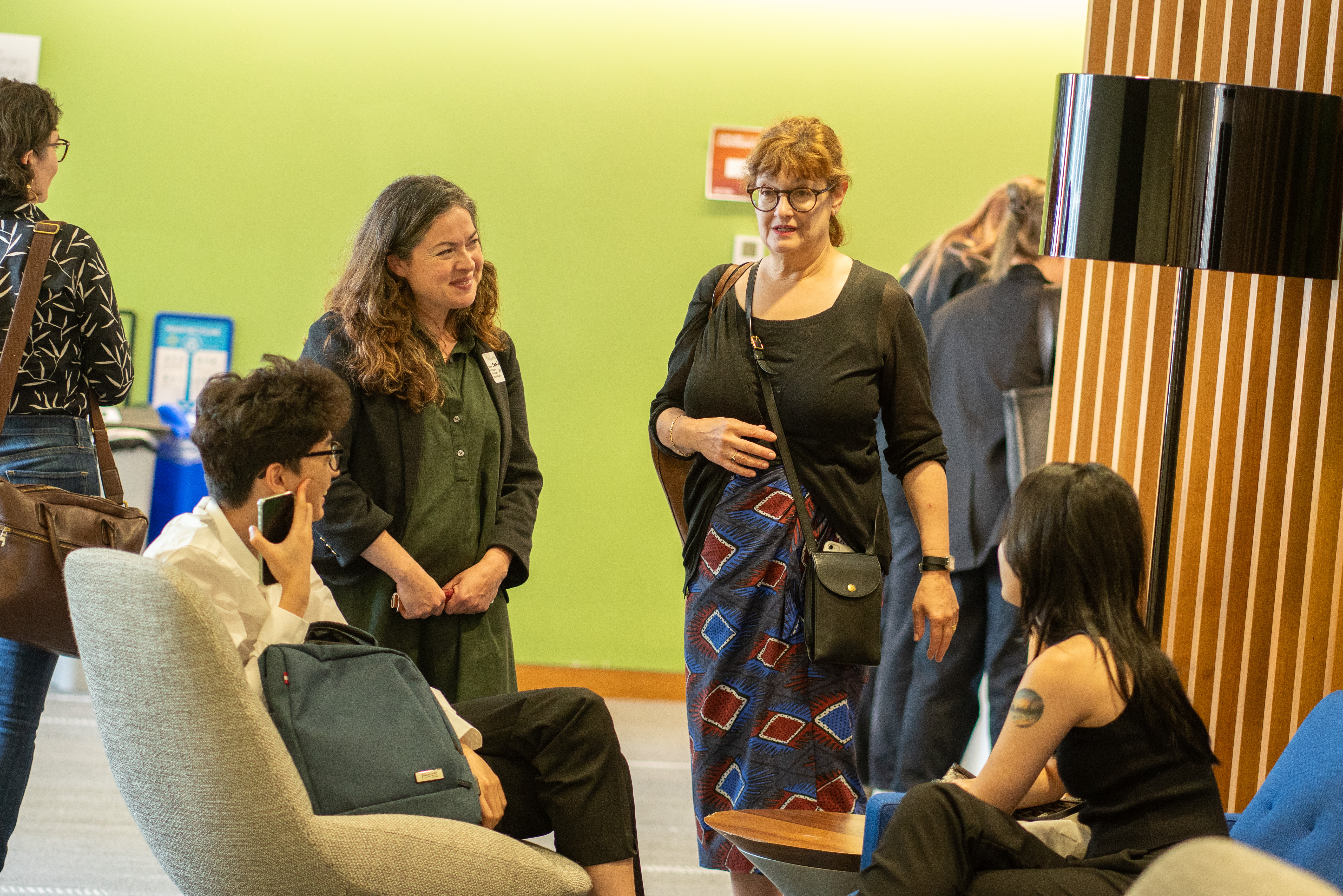
FAQ for CUSP Students
Students in their second year will enroll in USI I for their fall semester, and USI II in the spring semester. Both are required courses and must be taken consecutively. Course registration dates are announced via email.
Students are able to submit up to 5 preferred projects after viewing the Capstone catalog and attending the Meet & Greet, but selection is not guaranteed.
Students teams are carefully selected to ensure that a variety of skills and experience are included in the working group. Requests may be made, but are not guaranteed.
Classes are scheduled for Thursdays 6pm-8:30pm, but at it’s the discretion of the instructors to set the meetings.
Students can expect to spend at least 75 hours on their research project outside of regularly scheduled class each semester.
FAQ for Potential Sponsors
We accept sponsor applications from all public, private sector, or academic organizations looking to address a critical urban issue or research problem. Our sponsors in the past have included city agencies across the US, international universities, and non-profits. Your organization does not need to be located in New York City or the United States, as long as you can provide regular communication with your capstone team.
New York University Community: Any NYU research center, faculty member, or researcher with a new or ongoing research project is welcome to apply!
A Project Agreement will be developed and executed, which describes the project purpose, scope, and expected outputs. This document will also outline data sharing protocols and any restrictions on shared data.
We seek project sponsors that are engaged and enthusiastic about the use of data science in improving city operations and planning. We expect project sponsors to identify a primary Point of Contact for the project who will ensure data sharing agreements are executed; will provide regular feedback on the students’ work, through periodic meetings and review of progress reports and presentations; and will be able to attend the final project presentations. The specific expectations and time commitment will vary by the needs of the project, but project sponsors should be able to commit 1-2 hours every two weeks to the above activities. Our student teams are very capable, and this level of engagement will help to ensure the final deliverables and output provide value for, and are of use to, the project sponsor.
Please review the Capstone Sponsor Mutual Expectations .
The CUSP Data Facility is a secure research data environment with datasets, tools, and expert staff to provide research support services to students, faculty, and city agency employees. The CUSP Data Facility (CDF) connects all of these users to relevant datasets for urban policy research. The CDF reduces the multiple technical, legal, bureaucratic, capacity, and cost barriers to data access, so that the full research, policy, and operational benefits of data products can be realized by academic researchers and students, City analysts and managers, and other key partners in urban science.
We recognize that much of the data we manage, from streaming sensor data to agency administrative data, is sensitive and we handle it accordingly. The CUSP Data Facility’s Safe Data Environment comprises a multi-faceted approach to maintain safe data, through safe people, projects, settings, and outputs. This approach combines technical protocols, user policies, and user-centered design in order to ensure adherence to data governance requirements.
- Safe people: regular trainings on responsible data use and privacy & confidentiality, combined with updated online resources on best practices in data management
- Safe projects: standards and protocols for managing access to datasets and databases at the project level
- Safe settings: a secure data environment with restricted data ingress and egress
- Safe outputs: a statistical disclosure limitation prior to any export of products derived from restricted data
The Data Facility and Student Capstone Projects – CUSP students and faculty and host agencies are encouraged to perform all Capstone research within the Data Facility. CUSP will process new project data and create project workspaces where designated team members can work with their project-specific datasets and collaborate on data analysis and visualization. Other data facility users will not have access to the project workspace.
There is no fee associated with the Capstone projects.
We are not accepting proposals at this time. When the application opens, we will make the form available on this page.
Capstone project group selection methods will be based on several criteria including students’ ranked preferences. Based on student interest, it is possible that an approved project may not be utilized. Demographics and competencies will also be considered in order to ensure group heterogeneity. Any potential conflicts of interest must be disclosed by project sponsors in advance.
Project sponsors are able to provide input about what types of skills may be most useful to their project activities but will not be able to directly choose their student teams.
Please email [email protected] with any additional questions about the Capstone Program.
Apply to Sponsor a Project
Project proposals are due by April 12th. If you have further questions regarding the application or selection process, or the program at large, please contact Danielle Wright ( [email protected] ). Don't miss your chance to make an impact--for our CUSP students, for your organization, and for city dwellers around the world!
Previous Sponsors
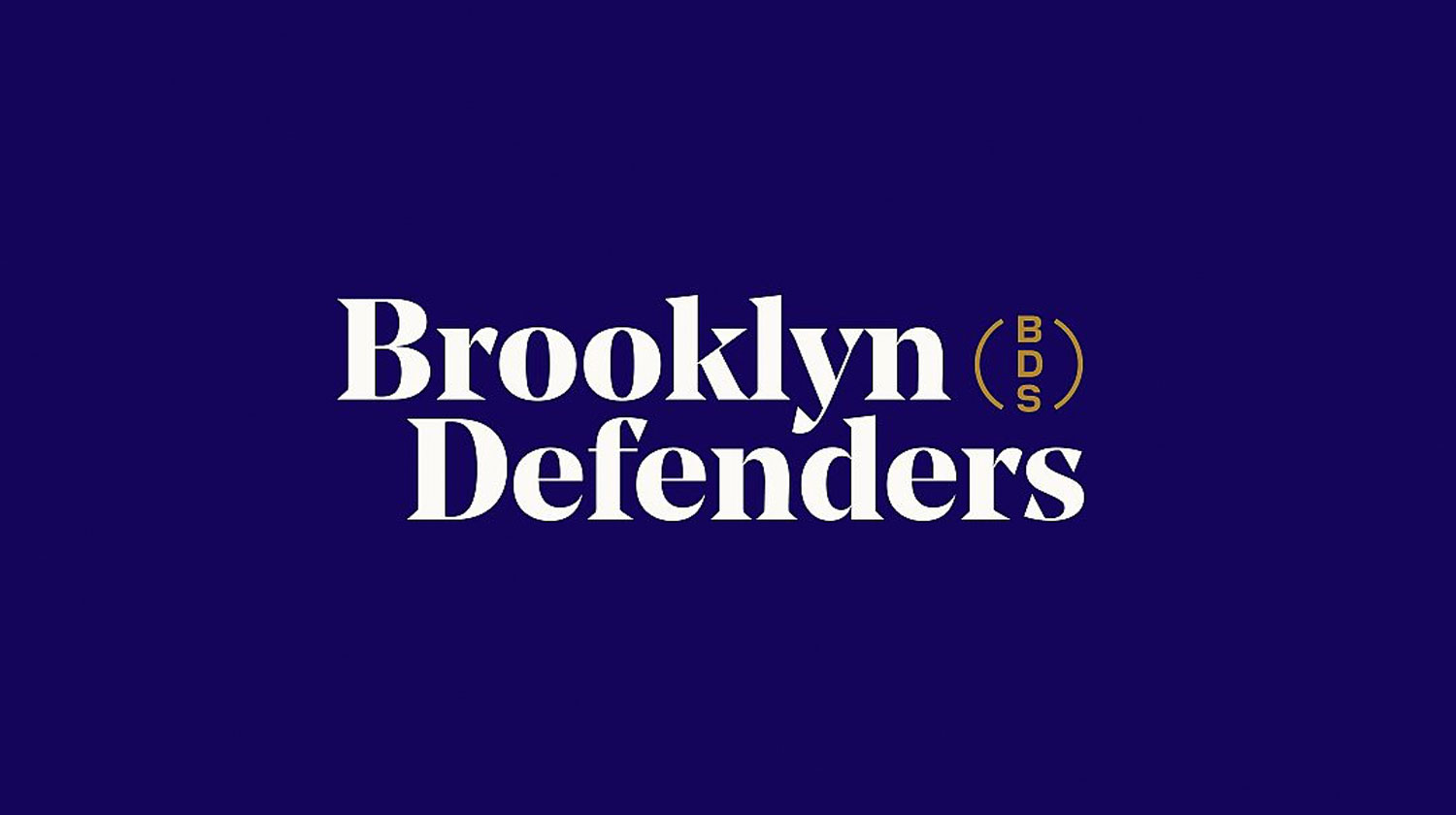
News from the Columbia Climate School
Student Spotlight: Navigating Sustainable Development for My Career Through Capstone Projects
Lylia Saurel
Adrienne Day
Marcella Petiprin and Andrew Pontius, two seniors from the Undergraduate Program in Sustainable Development (SDEV) program, have completed capstone projects at Columbia’s Climate School. They share some of their experiences and advice for students who wish to pursue an academic career in sustainability.

Marcella Petiprin was born in Flint, Michigan, and grew up passionate about the outdoors with a focus on water. Her family owns a Christmas tree farm and she is enthusiastic about giving back to the community. She currently sits on the board of the Flint Classroom Support Fund.
What drew you to the sustainable development major or special concentration?
I was most excited to discover that the sustainable development curriculum was one that focused on the social and economic features of environmental and climate issues. While I initially came to Columbia as an environmental science major, I’d always been aware of and interested in the important interactions between people and the environment because, to me, understanding these interactions is fundamental to making the monumental changes necessary to combat climate change and environmental degradation.
What advice do you have for students who wish to enroll in the Sustainable Development program?
My advice is to take as many cross-listed courses as possible. The sustainable development major is unique in the wide breadth of courses offered in different departments, and I wish I’d taken advantage of more economics, engineering and environmental biology courses. Through the Sustainable Development program, not only have I been able to build a strong foundation in Earth and environmental science, I’ve been able to explore how to build upon them in the real world and to shift the priorities of businesses and governments toward a more sustainable future.
What was your favorite class in the Sustainable Development program and why?
The energy law course with Michael Gerrard sparked my interest in renewable energy, motivated me to choose a career path in the energy sector, and gave me a robust foundation of knowledge which has been supremely valuable.
How did the program shape your understanding of sustainability?
The program has most strongly expanded my view of sustainability as being universally applicable. Sustainability is important and accessible to all people, all communities and all sectors. Sustainability is not only a discipline in and of itself, but a part of all other disciplines. While this certainly expands the scope of sustainability, it also gives me great hope for a future where sustainability is an ingrained practice for everyone.
Can you talk about your capstone project?
The Pearl River in Jackson, Mississippi, has a major flooding issue exacerbated by a local precedent of permitting development in the floodplain and bureaucratic gridlock within local, regional and state authorities, which has prevented Jackson from moving forward on any new flood control projects for nearly 40 years. In a partnership facilitated by the Community and College Partners Program (C2P2), our capstone project has been working with the nonprofit Mississippi Citizens United for Prosperity (MCUP).
We developed a detailed community survey to make up for a historical lack of tangible data on the scale of flooding and the direct and indirect impacts on the local neighborhoods. Our visit to Jackson and direct engagement with the local community improved our understanding of the issue tremendously. We noticed there was a lack of understanding of relevant hydrology principles, available flood management options, as well as the private, nonprofit and political interests, which were all vying for public support, all stemming from a lack of centralized information.
Ultimately the capstone workshop was one of the most rewarding experiences of my academic career. It was incredibly meaningful to work with MCUP to develop deliverables that would be useful to the community and have a positive impact. My advice for future groups, those working with MCUP and in general, is not to underestimate nor underutilize local embedded knowledge. There is a long history of privileged students parachuting into communities with backgrounds that are often different than our own and attempting to implement what we idealize as effective solutions, but it is extremely important to remember that the people who live in these communities are informed, knowledgeable, thoughtful and should be engaged in problem-solving every step of the way.

Andrew Pontius is originally from Bremerton, Washington. Before joining the Sustainable Development program at Columbia, he had an 11-year dance career in Seattle and Europe where he toured and performed in both ballet and contemporary dance. As a lover of the outdoors, Andrew has also lived on a sailboat in Seattle.
During my time in Dresden, Germany, I had fantastic roommates who encouraged me to be more mindful about my consumption and to live more efficiently. That is how my concern with consumption and waste started, but then once back in Seattle, waking up in the morning to ash everywhere from nearby forest fires was a real wake-up call. Without the beauty of our natural world, what is there?
Do it! We need everyone tackling sustainability problems and how to share resources for all. There are a lot of great classes to choose from, so be curious and try new things. The workload is heavy, but professors are very supportive. If you’re searching for a way to connect with a grassroots community organization, I would recommend completing a capstone with Radley Horton .
What were your favorite classes in the Sustainable Development program and why?
As someone with interests in the future of energy in the US, the energy law class with Michael Gerrard was one of my favorites and I would recommend it to anyone who wants to learn more about energy. The Catskills watershed class was a very cool way to learn about New York City’s deep roots and history for sourcing its water. All the sustainable development professors I’ve had the chance to work with were kind, approachable and inspiring.
This is an empowering degree and I’m very thankful to have gone through such a rigorous yet enjoyable program. The program taught me that sustainability means different things for different people and that not everyone can afford to switch how they source and use energy or what products they buy. My classes have highlighted that sustainable development is a complex issue that needs to be addressed from a variety of angles.
Can you talk about your capstone project and what it entailed?
The Jackson Mississippi capstone group collaborated with a community organization on flood-related research. Together, we developed a comprehensive survey and crafted an informative story map for their webpage. Additionally, utilizing a Problem Tree framework—an approach to problem identification and solution generation used in engineering—we identified and connected various direct and indirect causes and effects of flooding in Jackson, providing valuable insights for the community.
The best part of the capstone project was working with local community members and getting to know people who fight for the well-being of their community. We conducted research while visiting the neighborhoods most impacted by persistent flooding. There are of course work expectations, but it is also somewhat freeform, so you have to apply yourself to learn and contribute to the group. The project taught me about comprehensive social and Earth sciences that informed both my personal and professional lives.
Related Posts

Sustainable Development Program Hosts Annual Alumni Career Conversations Panel

Register to Present at the Climate School’s Earth Month and Student Research Showcase

Student Spotlight: Exploring the Impact of Sustainable Development on Study Abroad Experiences

Celebrate over 50 years of Earth Day with us all month long! Visit our Earth Day website for ideas, resources, and inspiration.
Get the Columbia Climate School Newsletter →

COMMENTS
Since a capstone project is meant to be completed in the final year of graduation, it is much less time-consuming when compared to a Research oriented project. Research projects require students to put in greater amounts of knowledge, time, and effort in comparison to a capstone project. A capstone project, though, is not a necessity for ...
It is usually a shorter and less complex study compared to a dissertation. A thesis may involve original research, but it can also be a literature review, a case study, or a critical analysis of existing research in the field of study. Capstone: A capstone is a culminating project required to complete a degree program.
Learn about the key similarities and differences between a dissertation, thesis and capstone project. Free dissertation template included. About Us; Services. 1-On-1 Coaching. Topic Ideation; ... Dissertations and theses are both formal academic research projects. The main difference is the level of study - undergrad, Masters or PhD ...
It's a showdown! Dissertation vs Thesis vs Capstone Project. We explain the differences and similarities between these types of research projects in straight...
In many ways a thesis and a capstone are similar. They both follow a similar basic format and represent a scholarly effort of high quality. However, practice-based programs can use a capstone project to emphasize preparation of the student for professional practice. In contrast, a thesis is an academic-focused research project with broader ...
It is a comprehensive and interdisciplinary project that often requires students to apply the knowledge and skills acquired throughout their academic careers to solve real-world problems or issues. Capstone projects come in all shapes and sizes, including research papers, case studies, creative works, internships, and field placement projects.
The Capella doctoral experience offers a good comparison of the two types of final project. The Capella dissertation is a traditional five-chapter research document that you'll develop as you work with a faculty mentor and dissertation committee members. It's meant to be a work of high-quality academic research that contributes to your ...
A dissertation project generally focuses on filling a gap in current research or enhancing knowledge within a field through new research and analysis. A capstone project uses or extends existing research to address a problem by developing a product, program, or process. Completion time.
It is the only way to choose a topic and write your background and research methods section for the proposal. Of course, you'll continue to consult published work during the capstone course as well. Because this step is so important, we've created entire section on this topic (please see Literature Review, under Choosing a Topic).
Capstone projects vary not just in the type of project, also in the level at which they are done. There are projects for juniors and seniors in college as well as for postgraduate students. Here are some examples of the forms of projects depending on the academic level. In-depth research projects. Developing the concept of a product, tool, or ...
PDF | On Nov 16, 2021, Jolanta Burke and others published Undertaking Capstone Projects in Education: A Practical Guide for Students | Find, read and cite all the research you need on ResearchGate
A capstone is an end-of-program applied research project where students will spend twenty hours per week, for fifteen weeks, investigating a research problem alongside an industry stakeholder. Most research capstone projects are related to machine learning, computer vision, networking, HCI, cloud computing, AI, NLP, speech recognition, or ...
Thesis projects typically involve independent research and analysis. Both capstone and thesis projects require a significant amount of time and effort. It is important to note that regardless of the project chosen, proper grammar and language use are essential to effectively communicate ideas and research findings.
Introduction . The word 'capstone ' might seem confusing to you, but in simple words, capstone means 'the high point' or 'completion marker' in a student's career. A capstone project is mainly a two-semester project that is conducted in the final year of graduation, where students are supposed to independently or collectively research their topic of interest and participate in ...
Beyond the Research Paper: Redesigning the Capstone Project. Oct 5th, 2020 by Dominique. As we approach what would have been Fall break in a typical semester, many of us-students, faculty, and staff alike-are starting to feel like we've hit a physical and emotional wall. Burnout and fatigue are common to any semester, but COVID has ...
The capstone project in college is the apogee, or completion marker, of a student's coursework leading to the culmination of their program with a degree in their chosen field of study. The original definition of a capstone focuses on the actual stone placed at the top of a wall or building, marking the successful completion of the structure.
The heading continues the rising action of the research story. The writer details the quest and explains the choices behind the paths taken. The anticipation builds in this part of the story as the reader is enticed to find out the results, which is the climax of the research story. The Methodology is in Chapter 2 of capstone projects.
Abstract. This book is designed to facilitate understanding of education research and guide the development and the writing of a capstone project. In education, like other social sciences, we are ...
Literature reviews are are comprehensive summaries and syntheses of the previous research on a given topic. While narrative reviews are common across all academic disciplines, reviews that focus on appraising and synthesizing research evidence are increasingly important in the health and social sciences.. Most evidence synthesis methods use formal and explicit methods to identify, select and ...
research ethics, develop research questions, try out arguments, and learn processes of scholarly inquiry. Students will gain exposure to qualitative, quantitative, and mixed methods research approaches; read, analyze, and synthesize scholarly sources; and develop and present a research proposal for their Capstone Projects.
The peer review process is central to research writing. Research projects must undergo peer review before publication. The process requires a review of the project draft by a scholar knowledgeable in the discipline or field. The peer review is conducted and feedback is provided to the author. The author revises the work based on the feedback ...
Similar to CUSP's research activity, capstone projects must fit inside one of our main focus areas: urban health, urban environment, or urban infrastructure. View Previous Capstone Projects Project Details. Capstone projects approach real-world urban challenges through problem identification and scoping, data collection, and applying data ...
Study Overview. The Capstone To Work (C2W) project used a longitudinal multi-case design (Yin, 2014) that combined intensive quantitative and qualitative survey data over participants' first twelve weeks of work with interviews at regular intervals throughout their first year of work.
The best part of the capstone project was working with local community members and getting to know people who fight for the well-being of their community. We conducted research while visiting the neighborhoods most impacted by persistent flooding.